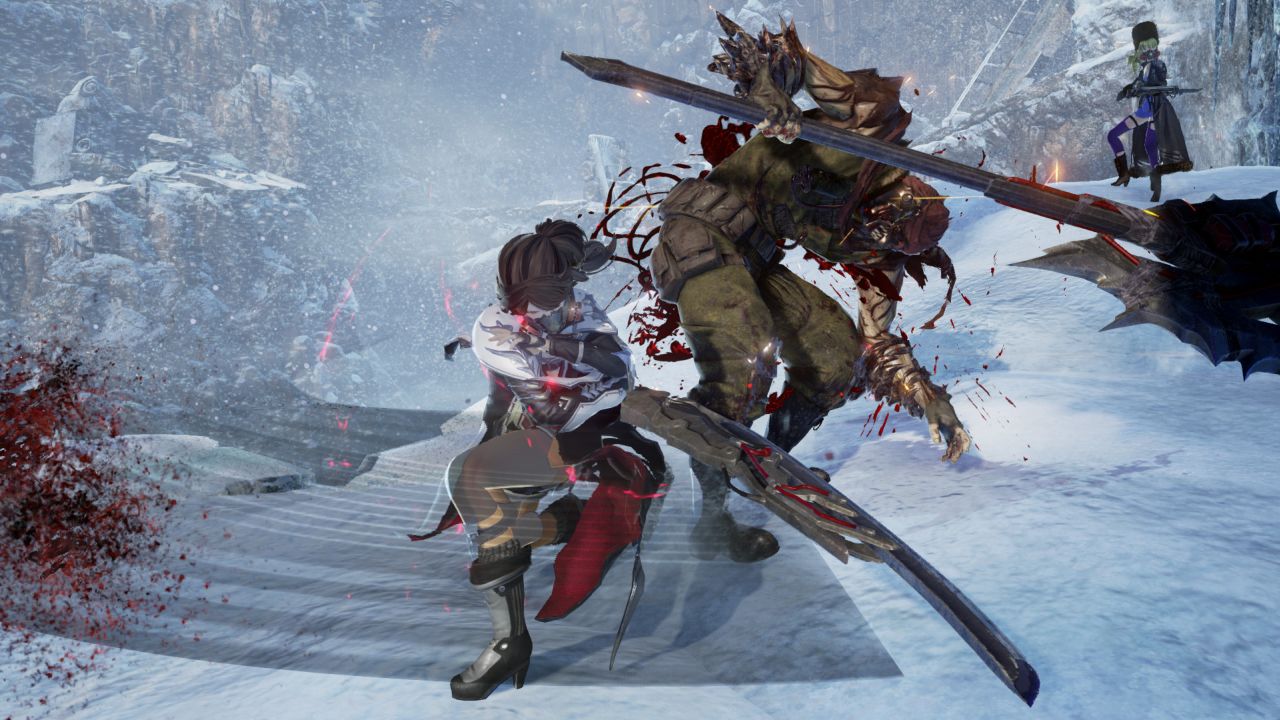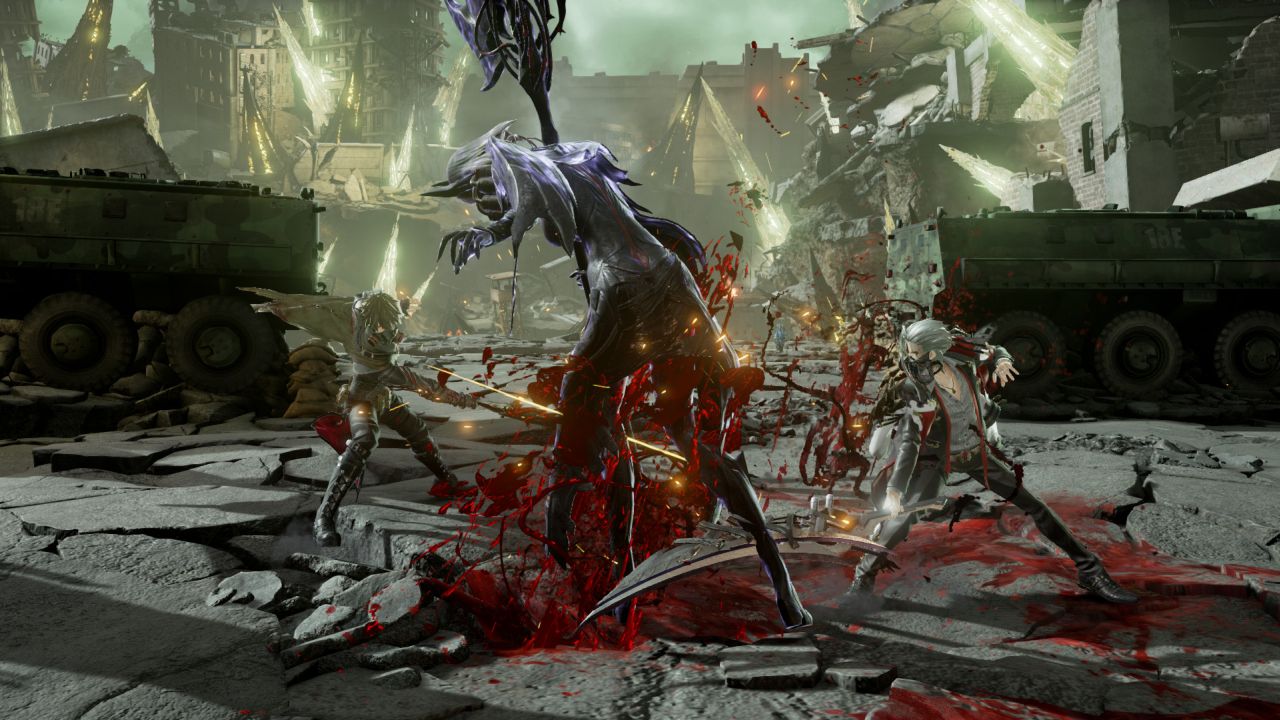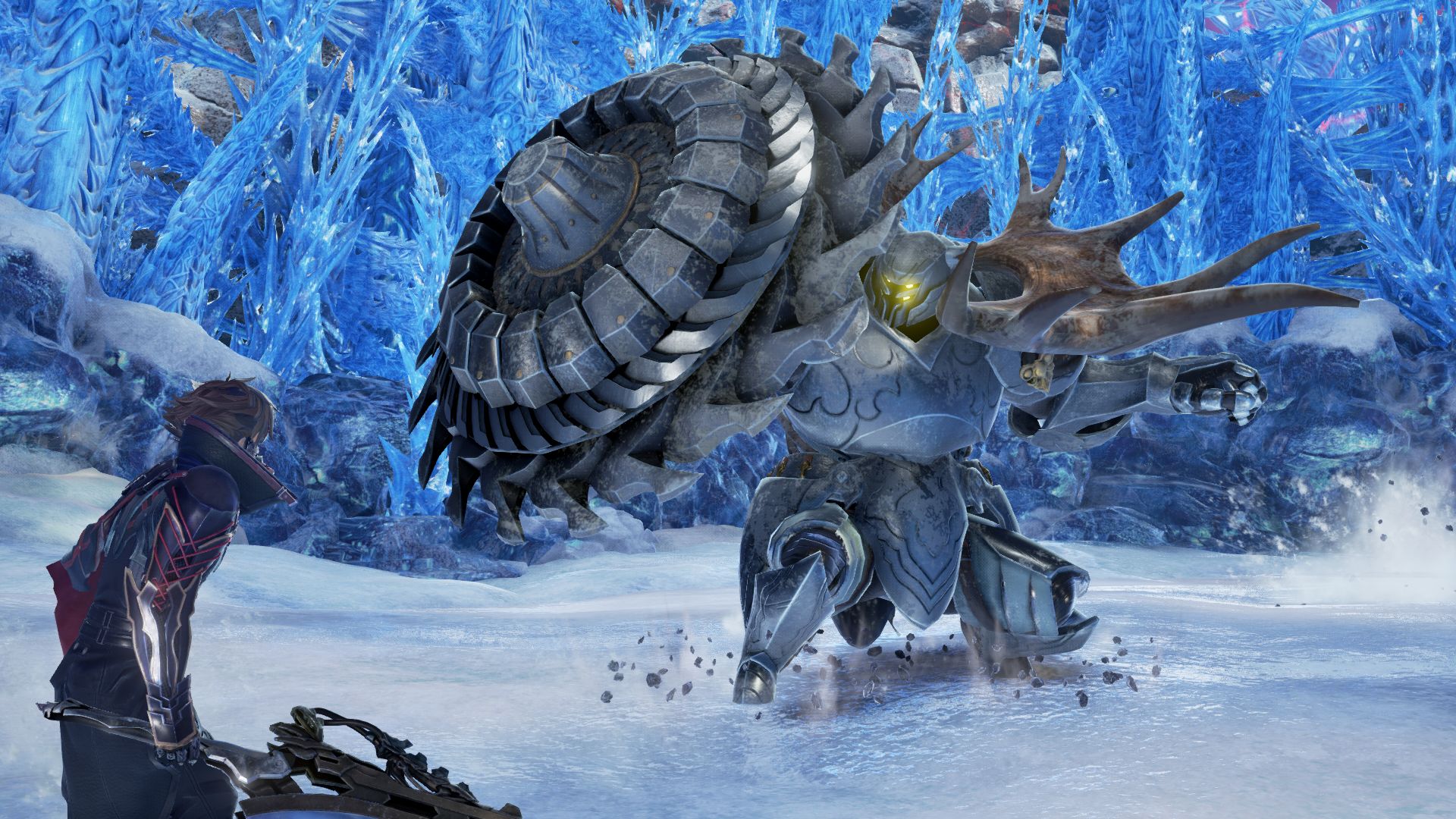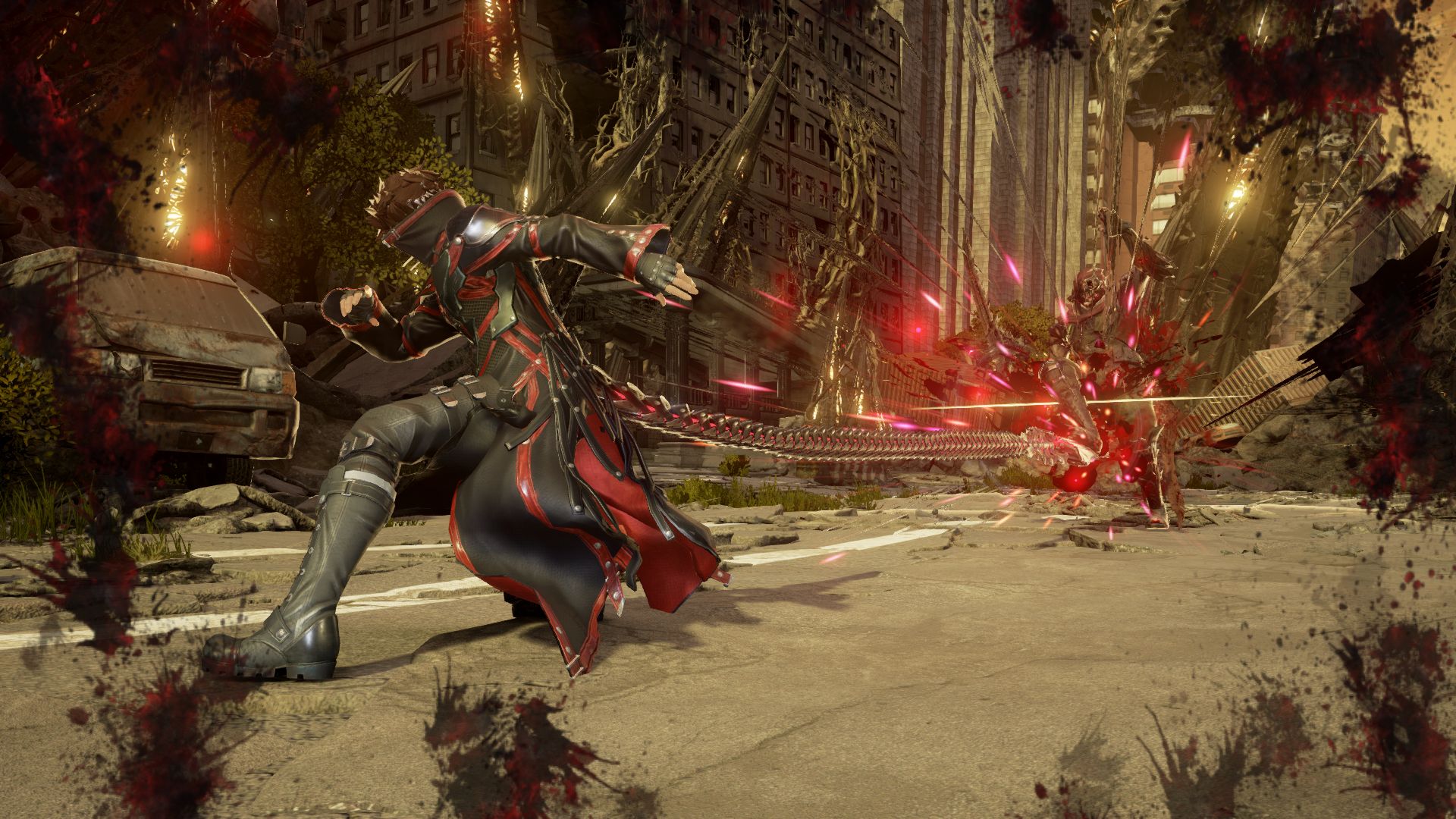Code Vein Review
This darkly-tinged dungeon crawler resides in a strange gaming ether that’s at once refreshingly unique while also being almost blatantly familiar. Code Vein runs full-throttle with the “Soulslike” format, but dresses it up with a Japanese post-apocalyptic anime flair, a bombastic premise, and a cast of colorful characters. The close-range combat in particular will instantly be recognizable to those who’ve powered through the grind that is Dark Souls or Bloodborne. While it’s competent in this area, it sort of makes you yearn for the real deal. However, the game does manage to feel distinct, and thus more exciting at points where it leans on its more unique elements. The satisfying Blood Code spells, cool weapons, AI partners, and a myriad of customizations sometimes manage to elevate Code Vein. Still, it’s not without blemishes and quirks, even when it does innovate.

The premise revolves around a ruined dystopia in which much of humankind has perished, and many that remain rely on blood for sustenance in an otherwise barren wasteland. On the one hand, you’ve got the Revenants – the game’s “good guys,” who come with an array of magical abilities. On the flipside, there’s the “ruined” version of this race, called the Lost. These are essentially mutants and shadowy warriors often laced in armor, wielding massive weapons which they flail about freely. As a Zelda fan, I can’t help but make a Ganandorf comparison with their designs. You soon discover that both you and your rare variety of blood are significant in this new, twisted reality, and you’ve got the power to restore memories. Memory loss is apparently an unfortunate side effect of becoming the vampiric mages these Revenants are.
When you’re not crawling through the webs of dungeon corridors and swinging your blunt object like a madman, you’ll spend some of your time collecting various items, including memories in the form of “Vestiges.” Returning them will prompt semi-interactive narrative bits that range from boring to mildly interesting. The rest of the plot beats play out through some flashy, but drawn-out cutscenes and casual dialogue exchanges. Still, while the cutscenes and forced exposition is a bit much, the actual premise is a cool one. The settings convey a distinctly rich post-apocalyptic atmosphere, which only intensifies as you venture onward. This is further enhanced by some gorgeous visuals, which display massive landscapes rife with rubble and towering ruined skyscrapers. The blood red-orange glow of the skies makes for a pretty trippy setting, and juxtaposes with the dark depths of the countless dungeons and caverns.
In true Dark Souls fashion, the crux of the gameplay revolves around collecting as much “Haze” as you can, which is the game’s version of Souls. This is essentially your universal currency, which is put towards leveling up at Mistles – the Code Vein equivalent of Bonfires. These are the man focal points you’ll be scrambling for after you and your AI buddy have grinded through a couple dozen monsters and are clinging to dear life. They’re essentially your oasis, as you can use them to save, heal, level up, and teleport from one Mistle to another.

As Souls fans know, depositing this Haze is a double-edged sword, as you’ll need to retrieve them at the spot of your death if you perish beforehand. Yet, setting camp and feeding Haze into the Mistles will respawn all enemies. The game’s major safe haven, though, comes in the form of a larger home base, where you’ll be able to buy/sell/swap goods, purchase and upgrade new gear, chat it up with your AI comrades, and listen to some cheesy hard rock blasting on the jukebox.
Another key feature of Mistles is that they’ll allow you to tinker with an element that’s basically Code Vein’s “ace in the hole;” its Blood Code system and its “Gifts,” or spells. This is essentially a complex system of character classes that comes with spells and passive buffs, which can be built up and swapped out on the fly. This myriad of Codes/Gifts coaxes you to explore, as they can be discovered in dungeons or handed out by NPCs. Distilling the nearly 3 dozen classes and their powers to their essence, though, you’ve basically got 3 major archetypes – the offensive Fighter, spell-wiedling Caster, and swift, versatile Ranger. Each class varies in style, strengths, and abilities, in addition to compatible weapons/gear.
My preference for the majority of my run was the Caster-based Codes, since I was often able to stand back and pummel enemies with long-range spells like the satisfying Blazing Roar. I found this style to not only be the most fun, but the safest strategy in the long run, as excessive melee fights with larger foes can bring swift and untimely deaths. This range of options adds an interesting dynamic and freedom to combat, allowing for a degree of strategy as you look to find the strongest, most complementary moveset. You can also pick one out of several AI companions to join you, which can be swapped out according to your preferred style and the enemies you’re fighting. For instance, if you want to keep your distance in an area rife with tougher foes, you may want to opt for Mia and her awesome bayonet rifle.

These companion fighters aren’t always the most useful or smart, and can in fact feel like a bit of a burden at times, especially during tough boss fights. Still, overall the AI element is a welcome one, as it makes combat less punishing and adds a bit of tactility. This attribute, coupled with the fun magic-wielding mechanic, gives Code Vein a unique sense of character which sets it somewhat apart from the Soulslike pack. The palette of powers, customizables, and commands can all be pretty overwhelming at first, but begins to click after some training and fumbling through the introductory dungeon. The close-range melee combat is simpler, but unlike the Gift system, leaves a bit to be desired.
In all fairness, the hack ‘n’ slash mechanic is at least competent, but doesn’t do much to excel. I didn’t exactly have high prospects when my very first death resulted in a blindsiding knockback from a foe that sent me tumbling off a cliff. Though upon leveling and grasping the somewhat tricky controls, I did manage to get into the “swing” of things, which increased my enjoyment. Still, there’s a prominent feeling of clunky looseness when fighting, and it can be both counterproductive and repetitive. There’s also the occasional wonky camera to deal with.
You’ve got a basic strike, a charge move, as well as parry and block commands which aren’t always reliable. One useful feature is to be able to lock on to your target by clicking the right stick – which is also hugely helpful in aiming long range attacks/spells. The fact that Code Vein comes with a pretty cool arsenal of weaponry does add some excitement to close combat – ranging from curved blades to scatter-shot bayonets to huge sledgehammers. There’s also a degree of strategy in the form of Ichor (mana) replenishing by performing certain feats in battle. Still, overall I felt the basic combat could have been a bit tighter, and more fleshed out.

Ultimately this dystopian, bloody dungeon crawler proves something of a mixed bag. It’s certainly rich in content and character; offering a 30-plus hour campaign, which doesn’t even include the isolated bonus dungeons. And you’ll probably be extending this runtime even further, as you’ll likely be starting over quite a bit – though a pretty moderate difficulty thanks to AI support keeps annoying deaths in check. While Souls fans should get a kick out of its familiar grindy, survival elements, Code Vein feels weaker when it tries to more closely emulate typical Soulslikes. Thankfully, there are plenty of areas in which this game does shine; not the least of which is its captivating atmosphere enhanced by an epic soundtrack and gorgeous visuals. Its AI partnering feature and interesting Blood Code system, while not revolutionary, are enough to make the game feel somewhat authentic.
